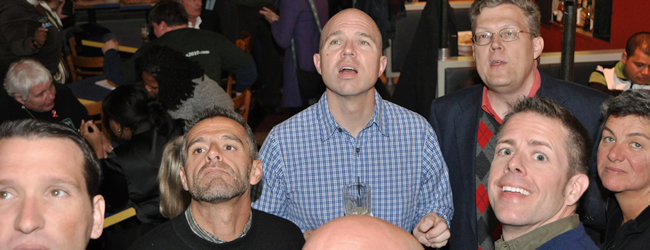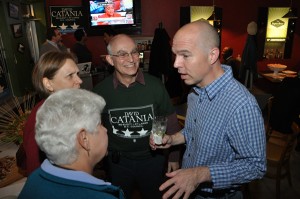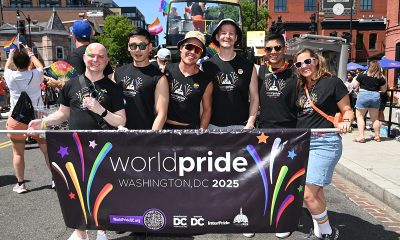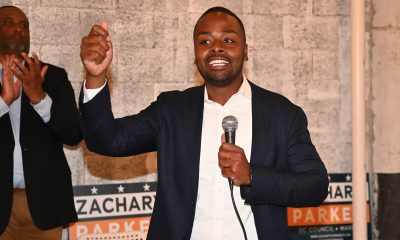Local
Catania, Graham breeze to victory; 7 gays win in Md.
Fenty write-in votes high in gay precincts


David Catania's re-election to D.C. Council was one of the few bright spots on an Election Day widely regarded as a disaster for gay rights. (Blade photo by Michael Key)
Pro-gay D.C. Council Chair Vincent Gray won his race for mayor with 73.9 percent of the vote and gay Council members David Catania (I-At-Large) and Jim Graham (D-Ward 1) easily won re-election Tuesday.
But an unauthorized write-in campaign for Mayor Adrian Fenty, who lost the Democratic mayoral nomination to Gray in the Sept. 14 primary, yielded high write-in vote counts in nearly all voter precincts with a high concentration of gay residents.
In Maryland, the number of out gay or lesbian members of the state legislature increased from four to seven in Tuesday’s election. Among the winners is Mary Washington, who captured a House of Delegates seat from Baltimore to become the first black lesbian to win a seat in the Maryland Legislature and the second to hold that distinction in the nation.
The “write-in” category in the D.C. mayor’s race won in at least two precincts with high concentrations of gays on Capitol Hill, highlighting the same racial divisions among voters that surfaced in the primary, where Gray won in majority black sections of the city and Fenty won in majority white areas.
Most of the gay precincts are in majority white sections, such as Dupont Circle, Adams Morgan, Logan Circle and Capitol Hill. Activists familiar with the LGBT community have said black gays, like their straight counterparts, supported Gray in overwhelming numbers. But because they are dispersed throughout the city and not concentrated in gay enclaves, like those in the mostly white areas, there are no known “black gay” precincts.
“I don’t think those are anti-Gray votes as much as they are pro-Fenty votes,” Catania said on Wednesday. “I think the vast majority of them, after the inauguration, those very same people will be very receptive to Vince and his message, and we’re all going to come back together.”
In his victory speech late Tuesday night at Love nightclub in Northeast D.C., which once hosted the city’s black LGBT Pride festival, Gray reiterated his campaign theme of “one city,” saying his administration will work hard to build unity among D.C.’s diverse population groups.
Most of the city’s LGBT activist leaders joined the Gertrude Stein Democratic Club, the city’s largest LGBT political group, in backing Gray in the mayoral race.
Gray captured 73.9 percent of the citywide vote, with the “write-in” vote coming in second with 22.8 percent. However, in majority white Wards 1, 2, 3, and 6, the margin between the Gray and write-in vote was closer, with the write-in vote count rising to between 30 and 43 percent. In Precincts 89 and 90 on Capitol Hill, which are home to a sizable gay population, the write-in vote came to 50.3 percent and 50.5 percent respectively, with Gray receiving 46.3 percent and 45.5 percent.
In the majority black Wards 4, 5, 7, and 8, the write-in vote fell to single digits.
D.C. Board of Elections and Ethics executive director Pokey Suleman said the city’s election law bars the board from identifying the names of people receiving write-in votes unless they capture enough votes to win the race. Most election observers assume the vast majority of write-in votes in Tuesday’s mayoral election went to Fenty.
“I would presume that the majority is for Fenty but I would not presume all of them are,” Suleman said.
In the at-large Council race, Catania came in second behind Council member Phil Mendelson (D-At-Large) in a four-candidate contest where the highest two vote-getters win the seats. Mendelson, who has a strong record of support on gay issues, and Catania endorsed each other.
Mendelson received 58.3 percent, with Catania receiving 30.9 percent of the vote. Both came out far ahead of challenger David Schwartzman, the Statehood-Green Party candidate who supports LGBT equality; and anti-gay independent candidate Richard Urban, who called for repeal of the city’s same-sex marriage law. Schwartzman received 6.8 percent and Urban received 5.1 percent. Non-Democratic candidates who win at-large seats traditionally have received less votes than the Democratic candidate in a city where the overwhelming majority of voters register as Democrats.
In the Ward 1 Council race, Graham received 81.3 percent of the vote compared to his gay Republican challenger, Marc Morgan, who received 7.6 percent of the vote. Statehood-Green Party candidate Nancy Shia received 9.5 percent.
Ward 5 Council candidate Tim Day, who became the fourth out gay candidate running for a D.C. Council seat this year, lost to incumbent Council member Harry Thomas, a Democrat, by a lopsided margin of 84.0 percent to 5.9 percent.
Day received the endorsement of the Washington Post. He drew additional news media coverage by disclosing IRS and D.C. corporation office records showing that a charitable constituent group that Thomas had been operating for many years did not have a tax exemption from the IRS and lost its corporate status from the city. The Post criticized Thomas over his handling of the charitable group. But the flap over the group did not help Day, an accountant, garner much support from voters.
Thomas has been a supporter of LGBT rights and voted for the same-sex marriage law, triggering organized opposition to his candidacy from church groups and the anti-gay National Organization for Marriage.
LGBT activists called the effort by some local religious leaders to target all Council members up for election this year because of their support for the same-sex marriage bill a total failure.
“In the end, it wasn’t the contentious issue that the opponents predicted,” said Mendelson, who also was targeted for his support for the gay marriage bill. “I can’t tell you how many candidate forums I went to where the issue of marriage equality did not come up,” he said.
“It’s striking that the opposition to marriage equality never got any traction in this election in spite of their intense rhetoric,” he said.
In the Maryland election, incumbent state Sen. Richard Madaleno of District 18 in Montgomery County won re-election with 74.5 percent of the vote.
House of Delegates incumbents Anne Kaiser (District 14), which includes Silver Spring, Olney, and Damascus; Heather Mizeur (District 20), which includes parts of Silver Spring and Takoma Park; and Maggie McIntosh (District 43), which includes parts of Baltimore, each won re-election by comfortable margins.
Washington, who ran in District 43, which has three seats, came in third with 31.6 percent of the vote. The highest three vote-getters win House of Delegates seats in most districts, which have three seats per district.
The other out gay or lesbian challengers who won on Tuesday were Luke Clippinger (District 46), which includes parts of Baltimore; and Bonnie Cullison (District 19), which includes parts of Montgomery County.
Most gay ANC candidates win races
Twenty-four of the 29 D.C Advisory Neighborhood Commission candidates identified by the Gertrude Stein Democratic Club as gay or lesbian or allies of the LGBT community won their races Tuesday. Fourteen of the winners are incumbents.
Three incumbents lost their seats in what observers called unexpected wins by their challengers. Among them were longtime ANC 6D07 Commissioner Robert “Bob” Siegel, who lost his Washington Nationals Stadium area seat to challenger David Garber. Garber had the endorsement of Council member Tommy Wells (D-Ward 6). In Ward 5, gay ANC 5C07 Commissioner Barrie Daneker lost to challenger James Fournier.
Gay incumbent Michael Patterson in ANC District 6B09 lost to challenger Brian Flahaven.
Following is a list of the ANC candidates, both incumbents and challengers, listed by the Stein Club as members or allies of the LGBT community. Candidates marked by an asterisk indicate they are either leading or trailing, and the final outcome won’t be determined until absentee and challenged ballots are counted.
Juan Lopez (1B07)—won
Bill O’Field (1C02)—lost
Mike Feldstein (2B01)—won
Jack Jacobson (2B04)–won
Victor Wexler (2B05)—won
Mike Silverstein (2B06)—won
Phil Carney (2B07)—won
Ramon Estrada (2B09)—leading by 39 votes*
Alexander “Alex” Padro (2C01)—won
Michael Benardo (2F06)—won
Lee Brian Reba (3C01)—won
Tom Smith (3D02)—won
Bob Summersgill (3F07)—won
Michael Yates (4C01)—won
Joseph Martin (4C09)—won
Thalia Wiggins (5B06)—won
Mary Lois Farmer-Allen (5C06)—won
Barrie Daneker (5C07)—lost
Adam Healy (6A01)—won
Neil Glick (6B08)—leading by 9 votes*
Michael Patterson (6B09)—lost
Larry Frankel (6B10)—lost
Brian Cox (6C05)—trailing by 13 votes*
Bill Crews (6C07)—won
Andy Litsky (6D04)—won
Roger Moffatt (6D05)—won
Robert “Bob” Siegel (6D07)—lost
Zina Williams (7B02)—won
Catherine Woods (7C03)—won
District of Columbia
Gay GOP group hosts Ernst, 3 House members — all of whom oppose Equality Act
Log Cabin, congressional guest speakers mum on June 25 event

U.S. Sen. Joni Ernst (R-Iowa) and three women Republican members of the U.S. House appeared as guest speakers at the June 25 meeting of Log Cabin Republicans of D.C., the local chapter of the national LGBTQ Republican group with that same name.
The U.S. House members who joined Ernst as guest speakers at the Log Cabin meeting were Celeste Maloy (R-Utah), Kat Cammack (R-Fla.), and Julia Letlow (R-La.).
Neither D.C. Log Cabin Republicans President Andrew Minik nor spokespersons for Ernst or the three congresswomen immediately responded to a request by the Washington Blade for comment on the GOP lawmakers’ appearance at an LGBTQ GOP group’s meeting.
“Please join us for an inspiring evening as we celebrate and recognize the bold leadership and accomplishments of Republican women in Congress,” a D.C Log Cabin announcement sent to its members states.
“This month’s meeting will highlight the efforts of the Republican Women’s Caucus and explore key issues such as the Protection of Women and Girls In Sports Act and the broader fight to preserve women’s spaces in society,” the message says.
It was referring to legislation pending in Congress calling for banning transgender women from participating in women’s sports events.
According to media reports, Ernst and the three congresswomen have expressed opposition to the Equality Act, the longstanding bill pending in Congress calling for prohibiting discrimination based on sexual orientation and gender identity in the areas of employment, housing, and public accommodations.
The Log Cabin announcement says the meeting was scheduled to take place at the Royal Sands Social Club, which is a restaurant and bar at 26 N St., S.E. in the city’s Navy Yard area.
D.C. Log Cabin member Stuart West, who attended the meeting, confirmed that Ernst and the three congresswomen showed up and spoke at the event.
“It was a good turnout,” he said. “I would definitely say probably 30 or 40 people attended.” West added, “Four women came to talk to a group of mostly gay men. That’s something you don’t see very often.”
District of Columbia
D.C. police seek public’s help in July 5 murder of trans woman
Relative disputes initial decision not to list case as hate crime

D.C. police are seeking help from the public in their investigation into the murder of a transgender woman who they say was shot to death at about 12:30 a.m. on Saturday, July 5, on the 2000 block of Benning Road, N.E.
But the police announcement of the fatal shooting and a police report obtained by the Washington Blade do not identify the victim, 28-year-old Daquane ‘Dream’ Johnson of Northeast D.C., as transgender. And the police report says the shooting is not currently listed as a suspected hate crime.
It was local transgender activists and one of Johnson’s family members, her aunt, who confirmed she was transgender and said information they obtained indicates the killing could have been a hate crime.
“On Saturday, July 5, at approximately 12:51 a.m., Sixth District officers were flagged down in the 2000 block of Benning Road, Northeast, for an unconscious female,” a July 5 D.C. police statement says. “Upon arrival, officers located an adult female victim suffering from gunshot wounds,” it says.
“D.C. Fire and EMS responded to the scene and transported the victim to a local hospital where after all lifesaving efforts failed and the victim was pronounced dead,” the statement says.
A separate police flyer with a photo of Johnson announces an award of $25,000 was being offered for information leading to the arrest and conviction of the person or persons responsible for the murder.
The flyer identifies D.C. police Homicide Detective Natasha Kennedy as being the lead investigator in the case and says anyone with information about the case should contact her at 202-380-6198.
Longtime D.C. transgender rights advocate Earline Budd told the Blade that one of the police investigators contacted her about the case and that she also spoke to Detective Kennedy. Budd said police confirmed to her that Johnson was a transgender woman.

One of Johnson’s family members, Vanna Terrell, who identified herself as Johnson’s aunt, told the Blade that Johnson used the first name of Dream and had planned to legally adopt that name instead of Daquane but had not gotten around to doing so.
Terrell said she and other family members learned more about the incident when one of two teenage high school students who knew Johnson’s brother contacted a friend and told the friend that they recognized Johnson as they witnessed the shooting. Terrell said the friend then called her to tell her what the friend learned from the two witnesses.
According to Terrell, the witnesses reportedly saw three men approach Johnson as Johnson walked along Benning Road and one of them called Johnson a derogatory name, leading Terrell to believe the men recognized Johnson as a transgender woman.
Terrell said one of the witnesses told the friend, who spoke to Terrell, that the man who shot Johnson kept shooting her until all of the bullets were fired. Budd, who said she spoke to Terrell, who also told her what the witnesses reported, said she believed the multiple shots fired by the shooter was an “overkill” that appears to have been a hate crime. Terrell said she too believes the murder was a hate crime.
In response to an inquiry from the Blade, Officer Ebony Major, a D.C. police spokesperson, stated in an email, “At this point there is nothing in the investigation that indicates the offense was motivated by hate or bias.”
Terrell said a memorial gathering to honor Johnson’s life was scheduled to be held Saturday, July 12, at River Terrace Park, which is located at 500 36th St., N.E. not far from where the shooting occurred.

District of Columbia
LGBTQ voters divided in Ward 8 special election
All four candidates on DC Council seat ballot are allies

Political observers, including LGBTQ activists, believe LGBTQ voters in Ward 8, like most if not all voters in the ward, are divided over which of the four candidates to support in the July 15 special election to fill the ward’s vacant D.C. Council seat.
Each of the four candidates, all of whom are Democrats, including ousted Ward 8 council member Trayon White, who is running to recapture his seat, have expressed support for LGBTQ related issues.
The special election was called earlier this year after the D.C. Council voted unanimously to expel White following his indictment and arrest by the FBI on a federal bribery charge in August 2024.
He has pleaded not guilty to the charge and under D.C. law he can legally run for and regain his council seat until the time he is convicted of the charge. His trial is scheduled to begin in January 2026.
The three candidates challenging White — Sheila Bunn, Mike Austin, and Salim Adofo — are longtime Ward 8 community advocates who have been involved in local government affairs for many years and, according to LGBTQ activists who know them, have been supportive of LGBTQ rights.
White also has a record of supporting LGBTQ issues while serving on the council since 2017. Following his indictment, he won re-election by a wide margin in the November 2024 general election against a lesser-known Republican opponent.
Political observers say White’s indictment on a bribery charge is likely to alienate some of his past supporters, but they say he remains popular in the ward, and with three candidates dividing the opposition vote he could win the election with less than 50 percent of the divided vote count.
Two of the candidates, Bunn and Adofo, responded to a request by the Washington Blade sent to each of the four candidates asking for a statement summarizing their positions on LGBTQ related issues. In their respective statements Bunn and Adofo expressed strong support on a wide range of LGBTQ issues.
“In my nearly 30 years of public service, I have consistently supported the rights and worked to improve the quality of life for the LGBTQIA+ community,” Bunn said in her statement. She noted that much of her work on behalf of LGBTQ rights took place when she served as chief of staff for D.C. Congressional Delegate Eleanor Holmes Norton and as a senior staff member for former D.C. Mayor Vincent Gray.
In his statement, Adofo said he advocated for a wide range of LGBTQ issues, including housing programs for homeless LGBTQ youth and supportive employment training programs for transgender residents.
“At the heart of our platform is a steadfast commitment to uplifting LGBTQ+ communities, ensuring that policy is shaped not just for them, but with them,” his statement says. Adofo’s positions in support of LGBTQ rights are also posted on his campaign website.
GLAA D.C, formerly known as the Gay and Lesbian Activists of Washington, released its ratings of three of the four candidates on June 22, based on its recent policy of basing its ratings mostly on non-LGBTQ specific issues. The group rates candidates on a scale of -10, the lowest possible rating, to +10, its highest rating.
It assigned a rating of +7.5 for Bunn, +6.5 for Austin, and +4.5 for Adofo. In a statement accompanying its ratings, GLAA said each of the three have a record of support on LGBTQ issues, but they lost rating points for not supporting non-LGBTQ related issues deemed important by GLAA.
GLAA said it did not issue a rating for White based on its policy of not rating candidates who are removed from office or resign due to allegations of ethics violations.
The Capital Stonewall Democrats, D.C.’s largest local LGBTQ political group, chose not to make an endorsement in the Ward 8 special election.
“We thought that this is best because this is a special election and in these unfamiliar times, we decided not to take a stand,” Howard Garrett, the group’s president, told the Blade.
Ward 8 gay Democratic activist Phil Pannell is supporting Adofo, he told the Blade, on grounds of Adofo’s strong support on LGBTQ issues and Adofo’s role as the only candidate in the Ward 8 special election who supported Initiative 83, the ballot measure passed by D.C. voters in November 2024 calling for a ranked choice voting system and open D.C. primaries. A lawsuit challenging the initiative filed by the D.C. Democratic Party has delayed its implementation.
Another longtime Ward 8 gay Democratic activist, David Meadows, is supporting Bunn. Meadows cites Bunn’s support for LGBTQ rights and her positions on other issues he supports as his reason for backing her candidacy.
The D.C. Board of Elections website shows that the board mailed ballots for the special election to all Ward 8 registered voters. The website shows that as of July 7, 2,483 voters sent back their ballots by mail or placed them in drop boxes located throughout the ward.
Early in-person voting at several polling places was scheduled to begin July 11, the website says, prior to the official election date of July 15 at all polling places throughout the ward.
Salim Adofo statement on LGBTQ issues:
Our campaign is rooted in the belief that everyone deserves to live with dignity, security, and opportunity. We are committed to building a safer, healthier, and more equitable District for all — where every voice is heard and every community is empowered. At the heart of our platform is a steadfast commitment to uplifting LGBTQ+ communities, ensuring that policy is shaped not just for them, but with them. We recognize that the fight for equity is interconnected, and we prioritize action in the areas that most deeply impact our residents’ daily lives. As [a] council member, I will advocate for healthcare for all, boost funding for HIV/AIDS, Hepatitis, STD, and TB Administration (HAHSTA) programs to address disparities in health outcomes.
• Expand access to care by exempting digital-only telehealth services from the Certificate of Need (CON) process and increasing funding through the Department of Behavioral Health (DBH).
• Build a culturally competent workforce by removing licensure barriers and expanding the pipeline of LGBTQ+ mental health providers.
• Employment and economic equity: sustain workforce development efforts like Project LEAP, a successful investment in economic empowerment for TGD residents.
• Foster public-private partnerships by requiring D.C. HR to work with labor unions and local employers to host trans-affirming job fairs.
• Fund community-led training by supporting programs developed by TGD organizations, modeled after California’s Transgender Economic Empowerment Initiative.
• Housing with dignity: every LGBTQ+ resident deserves stable, affirming, and permanent housing. End youth homelessness with a community-centered strategic plan focused on expanding permanent housing and wraparound services.
• Support inclusive housing by continuing funding for LGBTQ+ housing vouchers and senior housing initiatives.
• Safety and community support: create safe shelters by investing $2 million in a 20-bed LGBTQIA2S+ shelter for survivors of intimate partner violence and sexual assault.
• Empower community organizations with no-cost capacity-building support and streamlined access to D.C. grants for LGBTQ+-serving CBOs.
Sheila Bunn statement on LGBTQ issues:
In my nearly 30 years of public service, I have consistently supported the rights and worked to improve the quality of life for the LGBTQIA+ community.
As chief of staff to Congresswoman Eleanor Holmes Norton, I helped prevent Congress from overturning the District’s 2009 marriage equality bill and worked on removing congressional riders from the District’s budget that prohibited the expenditure of locally raised funds for our needle-exchange program, which has been pivotal in HIV/AIDS prevention.
As part of Mayor Vincent C. Gray’s senior staff, I assisted in launching the District’s transgender employment initiative under the Project Empowerment Program, increasing training and job opportunities for transgender residents. We also employed a member of the transgender cohort in the Mayor’s Office of Community Affairs after their tenure, demonstrating our commitment to the program. I facilitated efforts to end health insurance discrimination based on gender identity with DISB’s 2013 bulletin, ensuring coverage for services like mastectomies and hormone replacement therapy. Additionally, I helped to coordinate Mayor Gray’s first LGBTQIA+ Youth Town Hall to address the concerns of LGBTQIA+ youth and participated in cultural competency training to better support the District’s significant LGBTQIA+ population.
Currently, I am a member of the Capital Stonewall Democrats, actively engaging in Pride events and supporting LGBTQIA+ causes like the DC LGBTQ+ Community Center, a one-stop shop for services and programs with critical social service partners. Through direct outreach to organizations serving the LGBTQIA+ community, I aim to understand and represent their issues effectively. I look forward to collaborating with GLAA, Capital Stonewall Democrats, and other allied organizations to shape legislation and policies that benefit our LGBTQIA+ residents and all District residents.




















